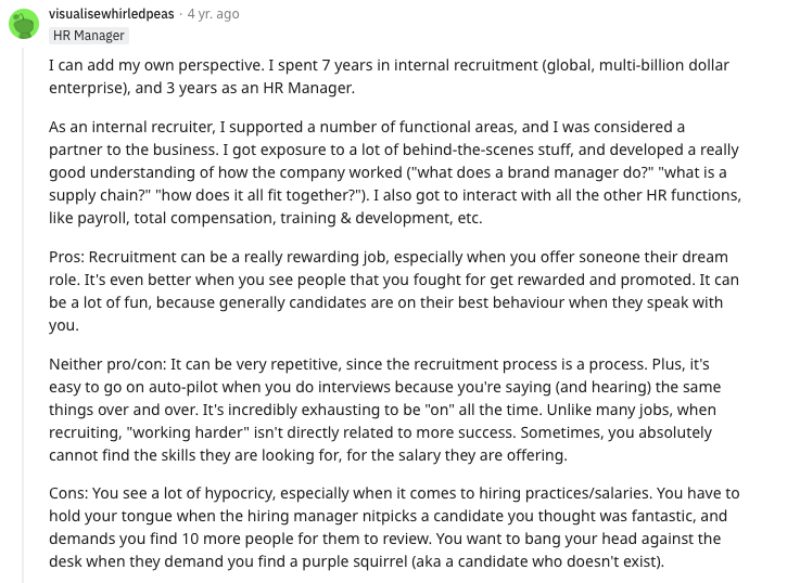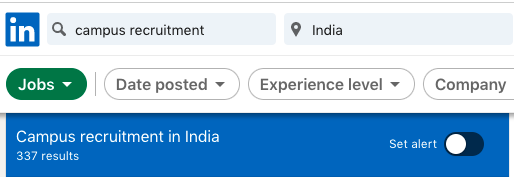
“Hiring, rather Campus Hiring, must be easy, right?” — ask your peers or colleagues from different departments, but that’s far from the truth.
The pain of scouring millions of resumes, manually browsing applications on LinkedIn, and responding to every single applicant, is incomparable and only felt by a recruiter.
It is a challenging yet rewarding job. You are, at the end of the day, changing someone’s life.
When it comes to recruitment, there are no black-and-white rules. What works for one company may not work for another.
Visualisewhirledpeas from Reddit gives a brutally honest view of the experience of a recruiter.

It’s obvious from the above that recruiting is no cakewalk. And, Campus Hiring is a domain of its own.
Campus Recruiters are responsible for owning the calendar, creating a Campus Hiring strategy, aligning the leadership on the said plan, and executing the plan with the help of a rock-solid recruitment team. Let’s dive into each aspect of Campus Hiring—precisely what you came here for.
What does a Campus Recruiter do?
Wait, is ‘campus recruiter’ a defined role in companies?
If you are like us, you also probably think Campus Hiring is an HR professional's responsibility. Large organisations generally have a dedicated professional that heads their Campus Hiring program, whereas, HR leads or founders hire at startups for all roles.
So, who is a campus recruiter?
Someone who lives on the campus to represent the company? Well, not really.
We took the effort to search for campus recruiter jobs on LinkedIn, and let’s just say, there are plenty.

We spoke with a few current and former recruiters, and here’s how they define the role of a campus recruiter:
1. Create a Campus Hiring Calendar
Campus recruiters devise a year-round calendar for campus recruitment activities per the business plans of the company. Companies plan the number of candidates they want to onboard in alignment with the functions they are hiring for, well in advance of the Campus Hiring season.
2. Build Relationships with Universities
Campus recruiters continuously work on building a relationship with universities and colleges they want to hire freshers from.
This relationship doesn’t end once the recruiters have hired freshers or students. It needs to be an ongoing process. Why? There are tons of companies that hire freshers from universities every academic year, and competing with tech giants such as Infosys, Cognizant, and Accenture is not an easy feat. They have built a solid reputation throughout the years, and hence, it’s imperative that recruiters and companies—small, and medium, not only maintain a positive relationship at the time of hiring but also engage with them throughout the academic year.
This typically falls under the gamut of ‘university relations’ in the job description section for campus recruiters.
3. Recruitment Marketing
As a recruiter, you need to proactively advertise and promote jobs by running marketing campaigns. Yes, recruiters need to pull up their creative sleeves for this one. Recruitment marketing is a growing function in most companies and startups. Why? Because recruiters, much like marketers, are evangelists for the company they are hiring for and need to portray their company in the best light to attract talent.
Such recruitment activities can and should be conducted both offline and on digital platforms.
Need some quick creative inspiration for your job ad?
Take, for example, Mailchimp—an email marketing company. They created this visual to attract job seekers for a support role. If it were up to us, we’d also apply (yes, it’s that good.) Check it out here: Mailchimp Famous Recruitment Ad.

Now, this could be a whole new topic altogether, but recruitment marketing is not a one-off activity. Prospective hires, university and college students—all of them actively scour through your website, LinkedIn page, and other digital channels to not only search for job openings, but to observe your work culture, and to get in touch with existing employees. This is why companies must ensure they’re advocating their culture and processes online.
4. Monitor Recruitment Metrics and Dashboards
To be successful at campus recruitment, build, report and maintain recruitment metrics after each Campus Hiring cycle. Typically, campus recruiters maintain this data on excel sheets or any third-party software. The data includes a list of hired candidates, candidates interviewed, assessment results, and group discussion scores.
Additionally, they need to continuously stay on top of their company’s hiring requirements. Businesses, more often than not, need a steady workforce, which is why campus recruiters must proactively communicate with the leadership team to prepare in advance.
Their job does not end with hiring. They ensure that the new hires of the company are onboarded successfully and offer them complete support till they have settled into their new roles. They continuously check in with the employees to ensure they are performing at their best and mitigate any challenges that may come their way.
Campus Hiring Cycle: A Complete Overview
1. Set Campus Hiring Timeline and Duration
Typically, universities begin their placement season around the second last semester or end of the second last year of the student’s degree course. For example: At law universities, the campus hiring drive begins at the end of the fourth year of a B.B.A LL.B course which spans 5 years. In most cases, campus recruiters continue to visit universities during the last year as well.
Similarly, at engineering colleges, campus placements usually begin at the end of the third year of their 4-year engineering degree, or during the sixth semester.
2. Align Leadership With The Campus Hiring Plan
After your campus recruitment proposal is in place, ensure that it is in sync with the business requirements for all aspects such as the number of hires, estimated budget and timelines. If you plan to use any online tools, such as ATS and online assessment platforms, allocate budgets for them and seal them with approval at this stage.
3. List of Target Universities and Colleges for Campus Recruitment
Next, create a list of universities or colleges for the open positions at your company. Then start connecting with the university’s point of contact, the placement cell coordinators.
4. Connect with the Placement Cell and Share the Hiring Process
As mentioned above, university relations are a crucial part of a recruiter’s job, which brings us to the next step of the process—connecting with placement cell coordinators to discuss the job vacancies and the compensation associated with them.
Reach out to placement coordinators through email, or if you have maintained a long-standing relationship, you can conduct your business via phone.
5. Finalise Logistics - Stay and Travel Arrangements
Once these details are finalised, the campus recruiter aligns the leadership team, and other recruiters on the plan, and finalizes the logistics such as travel dates, flights, and accommodation.
6. Year-round Recruitment Marketing Strategy
The hiring process begins months before the companies visit the campus to hire freshers. In tier 1 and 2 universities, CEOs and CXOs visit universities to conduct a couple of classes.
Now, there’s another strategy that companies adopt to attract talented freshers. They sponsor college fests. This allows companies to advocate their company culture and brand to prospective students.
The D-Day: The Day of Hiring or Placements
Before we jump to the nitty gritty of the hiring process, we’d like to draw attention to the fact that most universities and colleges follow different Campus Hiring processes. An engineering college’s Campus Hiring process will most likely differ from a management institute’s. The majority of companies vary in their Campus Hiring process but the fundamentals remain the same.
The hiring process should be segregated into the following:
Aptitude Assessment followed by a Group Discussion
Students appear for an aptitude or technical test basis their specialization. This is usually done using a pre-made assessment by the company.
After the initial screening, students are invited for group discussions wherein they are assessed for: confidence, behavior and interpersonal skills.
Now, each step of the hiring process acts as an elimination round. Let’s understand this with the help of a food analogy.
Say you go to a grocery store to buy potatoes, and well, grocery stores in India are notorious for keeping a mixed variety of potatoes on their shelves—good and bad. As a mindful consumer, you would want the best of the lot. So you decide to remove the not-so-good ones to find the spotless ones, that aren’t spoilt, and fall within your standards.
The parameters you choose for deciding what consists of good potatoes are:
Spotless, firm, and perceivably rich in their natural colour.
And so, you end up buying potatoes that fit your criteria. Voilà! You’re a happy customer, and well, we assume the potatoes you bought are happy too. And that’s exactly how campus recruiters use these rounds to hire the best of the lot. (no, we aren’t comparing students with potatoes.)
So, what’s the hiring equivalent of the above-stated example? Well, according to a recruiter from a big 4 consulting firm:
“Students need to show that they have a positive attitude, they are teachable and quick learners. We live to see students who show a willingness to team and partner with others since a lot of our work is group-based.”
Technical Round and an HR Round
After shortlisting students from the group discussion, campus recruiters usually conduct a technical round and an HR round.
A technical round, for example, may be conducted by someone who has subject matter expertise. Depending on the role, it could be a senior developer for an engineering role, a senior law firm associate for a junior to mid-level law associate role, the head of content for a writing or organic growth role, or a head designer for an apparel designer role. Or if you want to save your technical experts' time, you can simply test candidate skills with an automated assessment on Equip.
Besides a technical round, some companies may even test people by giving them a real-life case study.
An HR round, which may sometimes occur at the start or towards the end of the campus hiring process, evaluates whether the student would be a good cultural fit for the organization.
Announcing the Results
The campus recruiters collate the results and submit the same to the university or college. Subsequently, the universities release the list and share it with the students. Companies, in the meantime, prepare offer letters for the selected candidates and share them with students via e-mail.
If you’re building a Campus Hiring process from the ground up, know that the Campus Hiring processes vary from company to company, and there are no hard and fast rules.
Companies such as Infosys, Cognizant, Accenture, and the Big 4 had their processes built decades ago so don’t compare your processes with them. Don't compare apples to oranges.
What works for them may not work for an early-stage startup or even a mid-stage startup.
These are certain ground rules or frameworks that we’ve laid out above, however, as a recruiter, you’re free to experiment. You’re in the green zone as long as your processes are in coordination with your organization and the universities you’re planning to hire from.
Why should companies consider Campus Hiring and what are its benefits?
Campus Hiring is a strategy used by companies to increase their productivity, and as a result, their revenue. To put it in simple terms, the very nature of business, when it’s growing or scaling—requires skilled teams.
It’s cyclical—in the sense that as existing employees move up the ranks, or get promoted to senior or leadership roles, there arises a gap that needs to be filled by fresh university graduates, or interns. This is why companies that visit universities regularly, do so, because they experience exponential growth, and thereby require more human capital to grow their business every year.
Fresh talent adds a newer perspective, challenges the status quo, and helps positively impact a business’s bottom line.
In fact, hiring from campus allows recruiters to pick from a pool of readily available candidates. The effort, albeit high, ensures that recruiters can hire from dedicated campuses as opposed to diversifying their hiring outreach.
Younger talent, ones who are on the brink of looking for jobs are also less likely to ghost recruiters upon receiving offers.
Hence, overall, campus hiring can turn out to be a sensible, cost-effective, and time-saving bet in the recruiter’s hiring strategy.
How to approach colleges for Campus Recruitment?
The easiest way is to reach out to them through email which can be easily found on their website, or their LinkedIn page.
Craft an email to the placement cell head or the placement coordinator. This email must consist of all essential details such as the roles your company is hiring for, the number of freshers you plan to hire, and the compensation for each role.
Need access to phone numbers and email addresses of 800+ training and placement cell coordinators in India? Get the TPO Contacts Lists
This process is usually easier for companies that have long-standing relationships with universities. However, companies that need slots for Day 1 may need to invest in some way or another. This investment can be done in various forms—sponsorships, career days, in-house career days or office/industry visits.
There must be a multivariate way for companies and startups to approach their targeted universities instead of relying on a single source of truth. Begin forming relationships with not just the university’s placement coordinators but also with students.
The more visible you become on campus, the more students and university stakeholders trust you. It is plain old marketing at the end of the day—you need someone to believe in your company, its product or its service so you build trust among them by being of service to them. This is more important for startups because their product and company are still in their infancy.
Best practices to conduct a successful Campus Hiring drive
Best practices for a Campus Hiring drive are heavily contingent on the Campus Hiring strategy that is developed by the hiring manager.
A Campus Hiring strategy usually consists of building a solid hiring plan, and a hiring team, studying the university landscape, creating valuable content for students, and partnering with Alumni among other things.
Once your strategy is in place, you must ensure:
- You constantly update the manager and the leadership team on the hiring plan at all points in time.
- Communicate with students on campus at fixed intervals.
- Your assessments are prepared well in advance to avoid any last-minute hassle. Pre-preparing skill-specific assessments with the help of software such as Equip will help you save hours as opposed to creating assignments on google docs or on word documents.
Experts Speak: Campus Hiring Tips from Recruiters
Hear from industry professionals who walk the walk for campus recruitment.
The First Step Of The Campus Hiring Process
The first step in the Campus Hiring process is to align business heads to understand the number of freshers needed to justify workforce requirements.
- Vijayanand Kailash, ex-Product Architect at Zoho
On Campus Outreach
One of the effective ways to reach out to campuses is through email or LinkedIn. The email can be usually found on the University’s website. Additionally, recruiters can reach out to University Placement Coordinators on LinkedIn.
- Muskan, HR Manager
Adding value through Recruitment Marketing
CXOs teach a semester's worth of curriculum that replaces the typical management training for freshers, creating a win-win for both students and companies.
- Dushyant Mishra, former VP and Head of Rural Business Birla Sun Life Insurance
Conclusion: Hiring Doesn’t Have to be Tough
Campus Hiring is fun and exhausting because recruiters get to interact with students who are beaming with joy at the sight of multiple opportunities. You get to be a part of building someone’s future by giving them their first-ever job—if that isn't life-changing, we don’t know what is.
The exhausting bit ultimately ends up rather rewardingly. It always helps to automate a few things here and there; for example, using Equip’s pre-set skill-specific assessments can help you cut down hours that you would otherwise spend on preparing assignments on google docs or word documents.
Hiring doesn’t have to be tough. Let’s make it easy together.